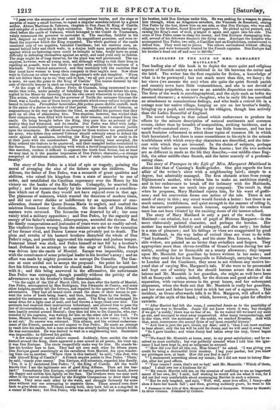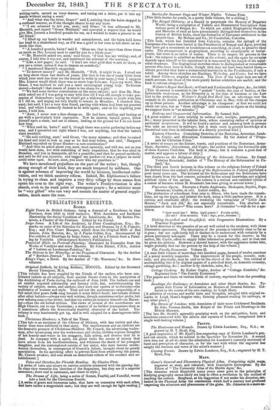PASSAGES IN THE LIFE OF MRS. MARGARET
MAITLAND.* THE leading aim of this book is to depict the more quiet and religious aspects of Scottish society as exhibited in its life between the cottar and the laird. The writer has the first requisite for fiction, a knowledge of what is to be portrayed ; but not much more than this, we fancy ; for her views (we assume the sex) when she quits the quiet Scotch parish and country town have little vraisemblance, and she is not devoid of Presbyterian prejudices, as sour as an amiable disposition can entertain. The form of the work is autobiographical, and the style such as befits the assumed character; a minister's daughter, who in early life has sacrificed an attachment to conscientious feeliugs, and who leads a retired life in a cottage near her native village, keeping an eye on her brother's family, bringing up a pupil, and attending to the villagers, though less actively than the Ladies Bountiful of England.
The novel belongs to that school which endeavours to produce its effects by the minute description of natural sentiments and common events, rather than by breadth of composition, striking incidents, and a varied well-sustained story. The writer has little humour, and has too much feminine refinement to select those topics of common life in which Galt luxuriated ; but there is some resemblance to his style in the minute truthfulness with which every-day characters are described, and the inte- rest with which they are invested. In the choice of subjects, perhaps the writer before us more resembles Miss Austen ; but the two authors are as different in mode as the life they describe,—one middle-class Eng- lish, the other middle-class Scotch, and the latter scarcely of a predomi- nating class.
The story of Passages in the Life of Mrs. Margaret Maitland is almost like that of Canning's Knife-grinder. One plot regards the love affair of the writer's niece with a neighbouring laird ; simple to a degree, but admirably managed. The first obstacle arises from young Elphinstone's mother, who wishes him to make an ambitious match ; and in her endeavours to break off the intimacy with the Maitlands, she throws her son too much into gay company. The result is, that when he proposes, Mary Maitland rejects him, for his want of godli- ness; and his conversion forms one action of the tale. There is not much of story in this ; any street would furnish a better : but there is so much nature, truthfulness, and quiet strength in the manner of telling it, that the narrative possesses much interest, especially for readers whose taste has not been vitiated by the exciting doses of the intense school The story of Mary Maitland is only a part of the work. Grace Maitland—no relation, but a sort of pupil of Mistress Margaret—is the more elaborately painted character, and perhaps the heroine. Her mother has married foolishly and unhappily, and dies early; her father is a man of pleasure ; and his failings or vices are exaggerated by good Mrs. Maitland, in the way ladies of retired ideas are wont to do with "bad husbands." This husband, and his sister Mrs. Lennox, a fashion- able widow, are painted as no better than swindlers and forgers. They appropriate more than eleven-twelfths of Grace's income during her mi- nority, sending her to Sunnyside on a scanty allowance; they impose upon Mr. Monteith her guardian by letters written in her name ; and when they send for her from Sunnyside to Edinburgh, carrying her thence to London and the Continent, they seem to act without any motive be- yond that of varying Mrs. Margaret's tale. If she were to be persecuted and kept out of society lest she should become aware that she is an heiress and Mr. Monteith is her guardian she might as well have been left at Sunnyside : unless, indeed, t'or the distress and good advice of the separation, with various scenes in the great house, and her subsequent elopement, when she finds out that Mr. Monteith is really her guardian, and her aunt and father have tried to trick her out of a signature. This incident, as Grace afterwards tells it to Mrs. Margaret, will afford a fair sample of the style of the book ; which, however, is too quiet for effective extracts.
"' After Harriet had left the room, I consulted Jessie as to the possibility of making our way to Broadlee. Jessie did not know where it was; but thought if we got a noddy,' there was no fear of us. So we waited till we heard my aunt go out, and managed to steal away unperceived. After many reconnoiterings, and in due time, with the assistance of the noddy, we reached Broadlee. And with that, aunt, commences the second fytte of my most eventful history.' "' And that is just the part, Grace, my dear,' said I, that I am most anxious to hear about; only the tea will be cold for Jenny, and we will send it away first.'
"So I gave thanks; and when Jenny had taken away the tray, Grace began again.
"'We found Mr. Monteith at home, aunt, to my great satisfaction; and he re- ceived us most cordially; but was perfectly amazed when I told him the igno- rance I had been kept in, and as indignant as amazed.
"'How did you find all this out, Miss Grace?' he asked. 'I was giving you. credit for being a distrustful little monkey. I beg your pardon, but pa know my privileges now, at least. Row did you find it out?' " I stammered something about my cousin; for I did not want to betray Har- riet, after her good offices.
"'Your cousin ? come, that's not so bad,' said Mr. Monteith. Which of them, miss? I shall owe her a kindness for it..'
" ' My cousin Harriet told me, on the occasion of confiding to me an important secret of her own, Sir,' I said; half wishing he would ask me what it was, for I did not feel very comfortable about encouraging Harriet in such a scheme. " But he only laughed, and said, ' Well, well, some love affair, I fancy—she shon d have her hands full'; and then, growing suddenly grave, he went to his
* Passages in the Life of Mrs. Margaret Maitland of Sunnyside. Written by Herielf; In three volumes. Published by Colburn. writing-table, opened an inner drawer, and taking out a letter, put it into my hands without saying a word.'
"'And what was the letter, Grace?' said I, noticing that the bairn stopped in a confused manner, as if she thought shame to say any more.
" am ashamed to tell you, aunt,' said Grace: it was addressed to Mr. Monteith, and signed "Grace Maitland," and conveyed a request that he would give Mrs. Lennox a hundred pounds for me, as I wanted to make a present to an old friend.'
"I lifted up my hands in wonder and astonishment, and the bairn held down her head in a shamefaced way, as if it was a grief to her even to tell about an un- truth like that.
"'A hundred pounds, bairn !' said I. Bless me, that is more than three times as much as Mrs. Lennox used to send for you in a whole year.'
Mr. Monteith asked me, aunt,' said lrace, if that was my writing; and, of course, I told him it was not, and mentioned the attempt of the morning.
"Like a law-paper; he said. I don't see what good that would do them, as you are a minor, unless it was to impose on somebody.' "I mentioned Harriet's suggestion.
"To borrow money?' said Mr. Monteith. 'Well, it might be so. I stood out so long about these fast drafts of yours, (for that is but one of many billet-doux which your aunt has done me the honour to write in your name,) that I suppose Mrs. Lennox would think there was no more hope from me. Upon my word, Miss Grace, I was inclined to call you a most extravagant young lady. To borrow money—humph! that cousin of yours is too sharp for a girl.' "We had some further conversation on the same subject; and then Mr. Mon- teith asked me if I was going to stay with him till I was old enough to take pos- session of aikenshaw; saying he would get a widowed cousin to reside with -him if I did so, and urging me very kindly to remain in Broadlee. I thanked him, aunt; but said, I had a very dear frieud, parting with whom had been my greatest trial, and whom I earnestly desired to be with again; and on his inquiring your name, I told him.
"'Aunt, I never saw a face change so. He had been smiling and looking at me with a particularly kind expression. Now he started, turned grave, threw himself upon a chair, and sat in silence, looking at the ground for I do not know how long.
"'What said he, bairn?' said I, though there was a mist gathering before my eyes, and I perceived not right where I was, nor anything, but that the bairn 's voice trembled.
"He said nothing, aunt,' said Grace, for many minutes; and then he raised his head and tried to look as easy as he had done before, and said, Margaret Maitland engrafted on Grace Hunter—a rare combination!'
"And then he asked about you, aunt, most earnestly, and told me, not as you would have done, but with something of testy impatience, that he was alone in Broadlee' and you in Sunny-side, all for a punctilio; and then he paused suddenly, and said he did you injustice, and begged my pardon—it was a subject he never could enter upon. So now, aunt, you know who my guardian is.'" We have mentioned prejudices on the part of the writer ; but, though Strong enough of their kind, they are much tempered by mildness. One is against schemes of improving the world by lectures, intellectual culti- vation, and we think sanatory reform. Indeed, Mr. Elphinstone's failure in trying to clean and improve a very dirty village by these means first opens his eyes to the right way. The writer's Presbyterianism is also stanch, even to its weak point of extempore prayer ; for a minister must be "very gifted" who can vary and sustain the matter of general suppli- cation, much more the tone.



























 Previous page
Previous page